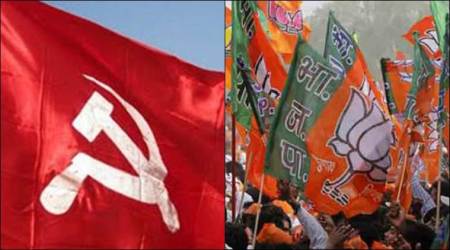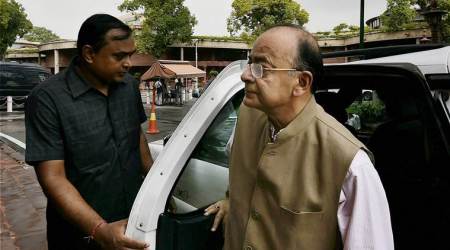 Police at Pinarayi village in Kannur to investigate the killing of BJP worker C Remith, allegedly by CPI(M) activists, on October 10, 2016. (Source: PTI photo)
Police at Pinarayi village in Kannur to investigate the killing of BJP worker C Remith, allegedly by CPI(M) activists, on October 10, 2016. (Source: PTI photo)
If politics is the prime mover of the cycle of CPI(M) vs RSS violence in Kerala, it also affects the course of justice in each case of murder. Tardy investigation by police and long delays in the trial process, an investigation by The Indian Express has found, is marked by a range of irregularities. Rival sides supply witnesses on demand, credible witnesses turn hostile out of fear and, in many cases, witnesses don’t even dare to step forward.
Result: the law, when it comes to political violence, doesn’t take its own course.
According to police and court records investigated by The Indian Express:
# As many as 49, over half of the 92 cases of political killings since 1995 in Kannur, Ground Zero of the political turf war, are stuck at the trial stage.
# Only nine are being investigated.
# Less than a fifth, only 18 cases, have ended in convictions: of 108 CPI(M) workers in 12 cases and 68 BJP workers in six cases.
 # 16 cases led to acquittals: of 70 CPI(M) workers in seven cases and 40 BJP workers in eight cases. In another case, seven IUML workers were acquitted.
# 16 cases led to acquittals: of 70 CPI(M) workers in seven cases and 40 BJP workers in eight cases. In another case, seven IUML workers were acquitted.
# None of the 12 killings in the last three years has reached the trial stage — four are still being investigated.
What this leads to is best illustrated by two cases pending at the district court from nearly 20 years ago, including a political killing inside Kannur’s central jail:
# The murder on May 18, 1998, of RSS-BJP worker Shaji, allegedly by six CPI(M) workers, is pending trial. The sessions court deferred the process for trial thrice, twice to make way for public holidays and again, three months ago, for a new judge who had taken charge.
# The killing on April 6, 2004, of CPI(M) worker K P Raveendran during a clash between jail inmates affiliated to BJP-RSS and CPI(M). With 31 RSS-BJP workers listed as accused, the case was scheduled for final hearing three years ago, but deferred several times since. The latest date of hearing is August 26.
‘Accused chosen by parties’
“In many cases, the accused are chosen based on a list given by the political party to which the victim belongs, be it the CPI(M) or the BJP, and witness statements collapse in court when the trials start after several years,” said K K Balram, the Kannur-based RSS state leader.
Many of these witnesses are even trotted out by the political party.
“Often, it turns out that the arrested accused are not the real culprits. The aggrieved person or his party would put his political rivals on the list of accused. At least 50 per cent of the accused in such cases would be innocent. After a stage, even the families of victims lose interest in the case,’’ said P Vishwan, who has appeared for the CPI(M) in several such cases.
The last case that led to such an acquittal — of 22 CPI(M) workers — was the murder of C Uthaman, a bus driver and an RSS worker, in Keezhur on May 23, 2002.
“Uthaman was killed near the CPI(M) bastion of Pinarayi, the village of Kerala Chief Minister Pinarayi Vijayan. This is one of many cases that ended in acquittal as there were no witnesses,” said V Sasidharan, who heads RSS activities in Mahe, south of Kannur.
Last October 10, Uthaman’s son, C Remith, 20, was killed in Pinarayi allegedly by CPI(M) workers — the case is still under investigation.
“The court had let free all the accused in my husband’s murder. Now, I fear the same fate awaits the murder case of my son,’’ said Narayani, 59, Uthaman’s wife.

‘No genuine witness’
Said Sasidharan, himself an accused in the attack on CPI(M) Kannur secretary P Jayarajan in 1999: “After every murder, mostly in the strongholds of either side, no genuine witness will give a statement. No one will dare to record a statement against the powerful political party. This forces the aggrieved party to supply witnesses. During the trial, which happens after several years, these false witnesses will be proved wrong or will fail to appear, leading to acquittals.”
The view from the other side is the same.
“If I was made an accused in the killing of an RSS worker, my party will not officially come forward to claim my innocence. The party workers will take up the responsibility, even if they haven’t committed the crime. They do it for the party. But, yes, this defeats the criminal investigation,” said a CPI(M) MLA from Kannur, speaking on the condition of anonymity. Also Read | In Kerala war, how RSS and CPI(M) are two sides of the same violent coin | Click here
RSS’s Sasidharan and CPI(M) leaders cite many examples — on both sides — where the victim’s families or parties did not even file appeals to challenge acquittals, knowing that the “case was weak”.
Records provided by CPI(M)’s lawyers show that such cases include the killing of CPI(M)’s Sundaran Master in November 1998, allegedly by 13 BJP-RSS workers; Manoj in December 1999, allegedly by a group of BJP workers; and Kunhikannan, allegedly by eight BJP workers in December 1999.
“On our side, the murder of RSS worker Sathyan in Thalassery (allegedly by 12 CPI(M) workers) in 2008 is one such case. We know we cannot go for an appeal even if the case ends up in acquittal. The case was registered when the CPI(M) was in power and the FIR was made in such way that no statements or evidence will help the prosecution,” alleged a senior BJP leader in Kannur.
‘No judges, high number of accused’
Police officers in Kannur point fingers at the legal system for the “inordinate delay”.
“Around 200 murder and attempt-to-murder cases, including political killings, are pending for trial in the district sessions court in Kannur. Due to long delays, chances of witnesses turning hostile are very high, which leads to acquittals. Money and political muscle play a critical role behind witnesses turning hostile,’’ said a senior police officer, who did not wish to be named.
“Besides, the district sessions court has a sanctioned strength of four additional judges, but there is currently only one. Trials in a few cases have had to be started afresh after the transfer of judges. There are cases in which witnesses had taken the stand over two years ago, and arguments are pending,” said the officer.
According to this officer, the high number of accused in each case also hampers investigation and prosecution. “In most cases, the number is between five and 15,” he said. Records show that since 1995, only one case of political killing had a single accused.
There is one high-profile case that has ended in a conviction — the brutal murder in a classroom of school teacher and RSS worker K T Jayakrishnan in 1999. But again, the case continues to be cited by both sides for the tint of gray that it still carries.
In August 2003, a lower court in Kannur sentenced five CPI(M) workers in the case. Three years later, the Supreme Court acquitted four, while commuting the death sentence of main accused Pradeepan A to a life-term.
Speaking to The Indian Express, Kannur’s CPI(M) chief Jayarajan and RSS’s Sasidharan said they still believe that Pradeepan was innocent.
When contacted, Pradeepan, who completed his sentence in 2011 and is currently the CPI(M) local secretary in Kannur, said: “I was convicted, the Supreme Court upheld the conviction and I served my punishment. What is the point in claiming innocence now?”
(Tomorrow: Minor incidents to family, party, caste: what triggers a Kannur killing)

